- Home
- Anna Campbell
The Highlander's Lost Lady Page 15
The Highlander's Lost Lady Read online
Page 15
“La signora Marina, she in good hands,” Sandra said in a fractured mixture of Italian and English. “Tutto va bene.”
Another broken cry from inside made Diarmid question that reassuring statement. Anxiety knotted his gut. Until tonight, when there was a chance they might lose her, he hadn’t realized how much he’d come to love Marina. And dear God above, he doubted Fergus would survive if the worst happened.
“Fergus, dinna shout at Sandra,” he said in a calming voice, stepping up and taking his friend’s arm to stop him barging into the room. “You ken that men have nae place in the birthing chamber.”
“Ye dinna understand.” Fergus turned a despairing face on him, and Diarmid’s stomach clenched with agonizing pity when he saw tears glittering in his friend’s eyes. “I have to be with her.”
Another scream from inside, then a silence descended. Diarmid’s grip on Fergus’s arm tightened.
That silence couldn’t mean Marina had lost the fight. It just couldn’t be true. By all that was holy, it couldn’t.
“Fergus…”
The silence went on and on. Diarmid’s blood turned to ice.
Finally and unmistakably through the closed door came the sound of a baby crying.
“What the devil…” Fergus choked out and broke free of Diarmid. Pushing Sandra out of the way, he shoved the door open and stood on the threshold. Behind him, Diarmid peered into the room.
Marina leaned against the pillows and reached out to take a remarkably red and noisy scrap of humanity from Fiona’s arms. Marina’s face was drawn and pale, and glowing with a pleasure that made mockery of all the pain that had gone before.
Jenny stood beside the bed, looking every one of her seventy-odd years, but he couldn’t doubt her joy either. Fiona glanced up as she passed the baby to Marina, and the smile she gave Diarmid sliced a hole in his brimming heart.
“Marina?” Fergus asked, his voice thick with emotion. He took an unsteady step into the room. “Mo leannan?”
“Caro…” she began, as her arms closed around the baby.
Jenny stalked across to him, speaking over whatever Marina meant to say. “Ye shouldnae be here, Mackinnon. Let me get your lady all clean and tidied up, and the wee bairn as well. Then ye can greet both of them properly.”
“To hell with that.” Fergus strode forward past Jenny. “Are ye all right, mo chridhe?”
“Mackinnon…”Diarmid could hear that the laird’s presence offended every scrap of Jenny’s sense of decorum.
Marina’s tired smile for her husband was so laden with love that Diarmid looked away, uncomfortable to intrude on this private moment. “Come and meet our daughter, then you’d better go before this dragon turns you to ash, tesoro.”
Astonishment and gratification filled Fergus’s face as he approached the bed, hesitant as Diarmid had never seen him hesitant. “Och, our daughter?”
“Sì, nostra figlia, amore mio.”
Diarmid watched Fergus reach out to touch the baby’s cheek, then he turned and left the room. Fergus didn’t need him anymore, and at this time, he had no place in his friend’s communion with his family.
He shut the door behind him and stopped on the landing to catch his breath. A wide smile curved his lips. Hurrah for Fergus. Hurrah for Marina. He couldn’t be happier for them. And hurrah for the bonny wee lassie, too, whatever her name was going to be. She’d had a big night of it as well.
Behind him, the door opened, and he turned to see Fiona carrying a pile of dirty towels. “Diarmid…”
She looked tired. She looked elated. She looked heartbreakingly beautiful.
He frowned. “What the devil are ye wearing, lassie?”
She glanced down at her loose linen blouse and red and black plaid skirt, caught at the waist with a black leather girdle laced in front. Her lovely hair was plaited away from her face in a simple style. “I couldn’t stay in my nightdress when I had to run up and down stairs all night. Kirsty, one of the maids, is about my size, so she lent me this.”
A tired laugh escaped him. The world had been a cold and empty place before he’d heard that baby’s cry. Now it seemed full of warmth and promise. “Ye look like a shepherdess in a folk tale.”
With a weary gesture, she brushed stray tendrils of hair back from her forehead. “If I do, I’m a shepherdess in need of a good wash.”
He frowned at the laundry in her arms. “Ye dinna have to rush around like a servant.”
She shrugged. “The lassies have been up all night, too. Jenny told them to go to bed a couple of hours ago, but they’re sitting down in the kitchen to hear the news. I’m off to tell them, so I may as well take something with me when I go.”
Jenny appeared in the doorway behind her. “Fiona, come back as soon as you’ve told them downstairs that all is bonny. We havenae finished here yet.”
“Jenny, she’s been up all night…” Diarmid said.
As an eleven-year-old boy, he’d met Jenny the same day he’d met Fergus. After he’d spent the night stranded on a mountain with his cousin Hamish, the old woman had checked him for any ill effects. Since that day, she’d never treated him with particular deference. Now she sent him a reproving glance. “Och, Mr. Diarmid, dinnae ye take away the best pair of hands I’ve had to help me in years. When the job’s done, we can all sleep.”
He’d noticed before that Fiona had a talent for making people like her. It had happened at Invertavey with John and Mags and the rest of his household. He shouldn’t be surprised that it happened here, too.
“I’d like to help, Diarmid,” Fiona said.
“Aye, your lady’s been a marvel. It was lucky ye brought the lassie here. There were a few moments when I couldnae have managed without her.”
His lady? If only Fiona were.
Idle thoughts. His mermaid was only interested in his ability to rescue her daughter. The surprise was that he looked at her now and realized that he’d give his right arm to change that.
Because God help him, when he’d seen his best friend smiling down at his wife and child, the woman who had filled his mind wasn’t Marina, but Fiona.
Chapter 18
“By God, Bruce Mackenzie makes the finest whisky in Scotland,” Diarmid said on a sigh of pleasure, as he leaned back in his usual chair in Fergus’s well-stocked library.
Fergus smiled at him from the other side of the hearth. “Aye. The laddie has a touch for it.”
A comfortable silence fell, broken only by the crackle of flames in the grate. It was late. Fiona and Marina were upstairs with Fergus’s three-day-old daughter, Eilidh. The household slowly began to settle into a new routine after her dramatic arrival.
The doctor had turned up the same afternoon Eilidh was born and had pronounced mother and child to be in perfect health. But while Eilidh might be in perfect health, she was far from a perfect sleeper. Both Fergus and Marina were looking frayed, as they adjusted to life as new parents. Frayed but happy. Diarmid surveyed his friend now and could almost see a golden glow of contentment surrounding him.
Another thing that pleased him was that so far, there had been no sign of the Grants. Achnasheen proved to be the perfect sanctuary. He doubted they’d ever guess where he and Fiona had taken refuge.
The problem, as he’d told Fergus and Marina the night he arrived, was that as long as her kinsmen kept Christina, they knew Fiona must eventually come out of hiding. If this turned into a waiting game, the Grants had all the advantages.
The thought darkened his easy mood. While he and his mermaid lingered in comfort at Achnasheen, a wee girl remained in the clutches of her brutish relatives.
“Recent events have distracted us from your problem,” Fergus said, proving his thoughts moved along similar lines.
“A worthwhile distraction.”
“Aye.” Fergus smiled. His friend had smiled a lot since Eilidh and Marina had emerged unscathed from their ordeal. “I willnae argue with that. But it’s time we decided what to do about the Grants.”
Diarmid sat
up and set his glass on the table at his elbow with a determined gesture. “Fiona and I have to go and get Christina.”
Fiona had suggested several times that they leave, but he’d argued her into waiting until she regained her strength. Her agreement had been reluctant. He sympathized with her impatience, but only today had he believed that at last she was up to traveling across Scotland.
“Aye. But it willnae be easy. The Grants will expect ye to turn up, and they’ll do their best to hold onto the bairn.”
“And to get Fiona back, too. Allan is set on marrying her to his brother, and they’ve already taken a deal of trouble to track her down to Invertavey. They willnae surrender her without a fight.”
Fergus frowned down into his half-full glass. “I’ve been thinking about your dilemma.”
“Aye?”
“Aye.” Fergus looked up. “While ye go and try to get Christina, I’ll head for Edinburgh and see what legal routes are available to restore Fiona’s daughter to her. For a start, under law, she must have some claim to a widow’s portion from Ian’s estate. Ye also mentioned there was a house she inherited.”
“That’s a bonny idea.” Diarmid wanted to kick himself. He’d been so focused on prizing Christina out of the Grants’ clutches, he hadn’t considered bringing the weight of the law against them. Yet he was accounted to be a thoughtful man who considered every angle before he acted. Fiona Grant had him in a spin, for sure.
“Och, I do have the occasional spurt of inspiration,” Fergus said drily. He paused and shot Diarmid a look he didn’t altogether understand. “If it comes to a court case, which it verra well may, telling the court that Fiona has means of her own puts her in a better position to gain custody of Christina.”
“Fiona’s nae longer a penniless runaway. She has powerful supporters. Ye and Marina. Me. Hamish, once I get him involved.”
“Aye, that’s true.”
When Fergus paused again, Diarmid frowned. His friend built up to saying something important. He knew the signs.
Fergus drank some more whisky before he went on. “Although her position would be even stronger, if she was married to one of those powerful supporters.”
A silence as hard and sharp as a slap crashed down and sucked all the air from the room.
“Married…” Diarmid said stupidly, feeling like that one word from Fergus punched the breath out of him.
“Aye. It would solve a gey lot of problems.”
His hands clenched on the arms of his chair, and every muscle tightened in rejection. “It’s…”
Fergus’s eyes were compassionate as they rested on him. “It’s a big step. And really ye dinna owe it to her. After all, it’s only chance that got ye involved in this mess in the first place.”
Chance or destiny?
From the moment he found Fiona on that beach, he’d felt fated to become her defender. These last days of fleeing the Grants and finding shelter at Achnasheen had only strengthened that conviction.
“I can see the idea doesnae appeal.” Fergus rose to pick up the decanter and refill their glasses, as if he hadn’t just shattered all Diarmid’s ideas about his future. “Forget I said anything.”
Married to Fiona? The suggestion was absurd.
Except it wasn’t.
It was no real effort to picture her as mistress of Invertavey. God forgive him, he could picture more than that. Fiona in his bed every night. Fiona presenting him with a child and wearing that same proud, exhausted smile he’d seen on Marina’s face three days ago. Fiona at his side as they made plans and established a life and grew old together.
No. No, it was impossible.
“She doesnae want me.” His tone was grim. He couldn’t help recalling that farrago of an attempt at seduction in the bothy.
Fergus considered that statement with a frown. “But ye want her.”
It wasn’t a question. Why would it be? Diarmid might struggle to hide his powerful yen for the woman he’d brought to Achnasheen, but Fergus knew him like a brother.
He made a helpless gesture. “Och, how could I fail to want the lassie? She’s brave and stalwart and in trouble.”
“And bonny.” Fergus set the decanter back on the sideboard and sat down, his attention unwavering on Diarmid. “Ye always swore you’d never marry a beautiful woman.”
An unamused smile flattened Diarmid’s lips. “After what happened between my parents, can ye blame me?”
Fergus shook his head. “Fiona’s no’ like your mother. Your mother followed her passions, with nae thought for her responsibilities. Fiona has put herself at considerable risk to save her daughter, including trusting herself to strangers for help. I’d say she has a loyal and gallant heart.”
“Nobody ever said that about my mother,” Diarmid said bitterly.
“No.” Fergus lifted his glass to take a sip. After a thorny silence, he went on. “It’s a huge change, a lifelong commitment. You’d forsake any chance of finding a woman ye loved and marrying her.”
Diarmid tried to imagine such a lady, but it was impossible when Fiona’s face filled his mind. “After what Fiona’s been through, I doubt she wants another husband.”
“No, I ken that. She’s like a mistreated filly, shying at the sight of the bridle.”
Dash it, Diarmid should reject this outlandish scheme out of hand. Marriage to Fiona was a crazy idea. After all, a fortnight ago, he’d had no idea she even existed.
If he went ahead with this, it was possible he’d never have a wife in his bed or legitimate children to succeed him. Fiona’s painful, arousing, distressing attempt at seduction had shown him that any man who wanted her needed to be kind and patient and ready to forsake his expectations of passion. At least in the short term.
But he was kind. And he was patient. And if a marriage protected her from the Grants, he had time to help her face her fears.
Heat flooded him as he imagined luring Fiona into pleasure’s realm. Too quickly, the heat threatened to turn into a conflagration. He struggled to clear his head and made himself think of what else Fergus had said. “Do ye think a legal challenge is feasible?”
Fergus shrugged. “I’m no’ an expert, but I imagine Fiona has grounds to claim her daughter back. Whether a court would go so far as to agree with me, I dinna ken. But it’s worth asking the question.”
“A legal solution offers a permanent defense against the Grants.”
“It means she wouldnae have to hide for the rest of her life—or flee to America.”
Diarmid frowned. “She believed those were her only alternatives. Abandoning the child to her kinsmen is unthinkable. The girl will be forced into marriage when she’s little more than a bairn. Fiona already knows what hell that promises. She’s lived through it.”
“I agree.” Fergus paused. “If we take this matter to court, the mother’s moral character will come into question. I’ve never met the Grants, but ye give me nae reason to expect a clean fight.”
Temper had Diarmid surging to his feet. “Are ye casting slurs on the lady’s reputation?”
Fergus didn’t shift from his chair, although his russet eyebrows rose with eloquent mockery. “Hell, laddie, you’ve got it bad. It’s perfectly clear that you’ve never laid a finger on the lassie, if only because frustration’s got ye wound tighter than a watch spring.”
A painful flush burned Diarmid’s cheeks. With a defeated sigh, he slumped back into his chair. “I dinna ken what the devil’s the matter with me.”
“You’re in a tizz over a lass.” Fergus raised his whisky in his direction. “It happens to the best of us.”
Diarmid ground his teeth. “She’s everything I dinnae want.”
“And everything ye do.”
“Aye, that she is,” he admitted glumly and lifted his own glass to drink. But not even Bruce Mackenzie’s finest could shift the desolation settling in his heart. “But she’s been hurt. Hurt deeply. I’d rather cut off my hands than hurt her again.”
Impatience flattened
Fergus’s lips. “Then don’t.” He took a mouthful of whisky. “But getting back to what I was saying—”
“Before I tried to knock your block off?” Diarmid said in self-derision.
“Aye, then. Ye know that she’s as chaste as the driven snow. So do I. But she was alone with this drowned fisherman.”
“He was an old man.”
“Old men have urges, as your lady could tell ye better than most.” Fergus didn’t wait for Diarmid to argue. “Then she was alone with ye at Invertavey.”
“Hardly alone. The place is crawling with servants.”
“Your servants.”
“And she was half-dead when I carried her up from the beach. Only a barbarian would have—”
“I’m looking at things the way the Grants will, as they’ll try and get a judge to see it. If there’s even a whisper that Fiona has taken a lover, the court case will have nae chance of succeeding.”
“I can produce witnesses to swear that my behavior was all that was proper.”
He stifled the memory of that first night in Fiona’s bedroom. On that occasion, if she’d been another woman in other circumstances, events would have turned out very differently.
But then if she’d been another woman, he wouldn’t have wanted her so desperately.
“I’m sure. But what about your two nights alone in the hills? And there’s an inn full of patrons to swear ye rode off with the lassie with nae chaperone in sight.”
“Oh, hell,” Diarmid said, his self-righteousness crumbling to nothing. “I swear I didnae touch her.”
That wasn’t true either. If he’d accepted what she’d offered, however reluctantly, they’d have become lovers in that isolated bothy.
“I believe ye. But it’s the appearance of sin that’s the issue, no’ whether ye sinned.”
Fate had indeed stalked Diarmid ever since he’d met Fiona. The conclusion became inescapable.
“I’ll have to marry her,” he said slowly.
Fergus’s gray eyes were alight with sympathy and understanding. Too much understanding, if you asked Diarmid. “I believe ye do.”
“She may no’ have me.” He wasn’t sure whether he spoke the words in despair or hope.

 The Seduction of Lord Stone
The Seduction of Lord Stone The Highlander’s Defiant Captive: The Lairds Most Likely Book 4
The Highlander’s Defiant Captive: The Lairds Most Likely Book 4 The Highlander’s English Bride: The Lairds Most Likely Book 6
The Highlander’s English Bride: The Lairds Most Likely Book 6 The Highlander’s Christmas Quest: The Lairds Most Likely Book 5
The Highlander’s Christmas Quest: The Lairds Most Likely Book 5 Mistletoe Wishes
Mistletoe Wishes The Highlander's Lost Lady
The Highlander's Lost Lady Two Secret Sins
Two Secret Sins The Highlander's Christmas Quest
The Highlander's Christmas Quest The Highlander's Defiant Captive
The Highlander's Defiant Captive Have Yourself a Merry Little Scandal: a Christmas collection of Historical Romance (Have Yourself a Merry Little... Book 1)
Have Yourself a Merry Little Scandal: a Christmas collection of Historical Romance (Have Yourself a Merry Little... Book 1) The Laird's Christmas Kiss
The Laird's Christmas Kiss The Highlander’s Lost Lady: The Lairds Most Likely Book 3
The Highlander’s Lost Lady: The Lairds Most Likely Book 3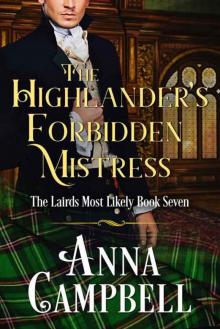 The Highlander's Forbidden Mistress
The Highlander's Forbidden Mistress Tempt the Devil
Tempt the Devil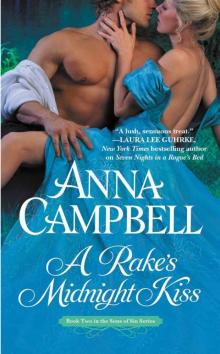 A Rake's Midnight Kiss (Sons of Sin)
A Rake's Midnight Kiss (Sons of Sin)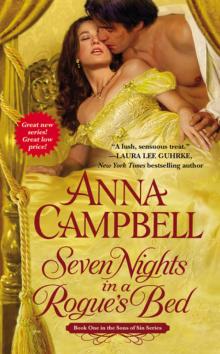 Seven Nights in a Rogue's Bed
Seven Nights in a Rogue's Bed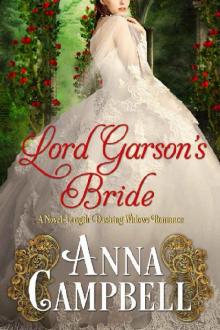 Lord Garson’s Bride
Lord Garson’s Bride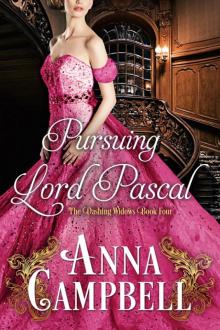 Pursuing Lord Pascal
Pursuing Lord Pascal Three Proposals and a Scandal: A Sons of Sin Novella
Three Proposals and a Scandal: A Sons of Sin Novella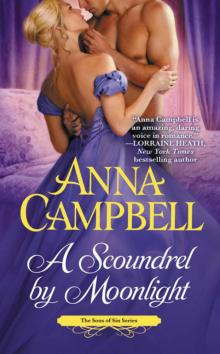 A Scoundrel by Moonlight
A Scoundrel by Moonlight The Laird's Willful Lass
The Laird's Willful Lass The Winter Wife
The Winter Wife Stranded With The Scottish Earl
Stranded With The Scottish Earl The Laird’s Christmas Kiss: The Lairds Most Likely Book 2
The Laird’s Christmas Kiss: The Lairds Most Likely Book 2 Days of Rakes and Roses
Days of Rakes and Roses Captive of Sin
Captive of Sin Charming Sir Charles (Dashing Widows Book 5)
Charming Sir Charles (Dashing Widows Book 5)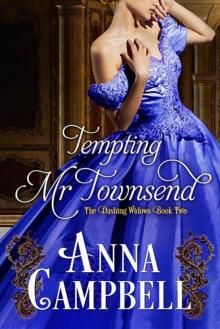 Tempting Mr. Townsend (Dashing Widows)
Tempting Mr. Townsend (Dashing Widows)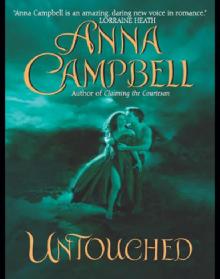 Untouched
Untouched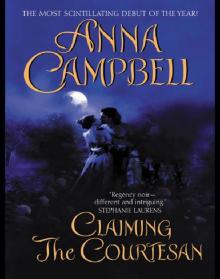 Claiming the Courtesan
Claiming the Courtesan A Pirate for Christmas: A Regency Novella
A Pirate for Christmas: A Regency Novella Her Christmas Earl
Her Christmas Earl The Laird's Willful Lass (The Likely Lairds Book 1)
The Laird's Willful Lass (The Likely Lairds Book 1) My Reckless Surrender
My Reckless Surrender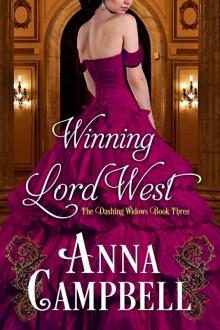 Winning Lord West
Winning Lord West What a Duke Dares
What a Duke Dares